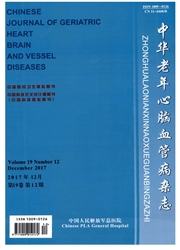

 中文摘要:
中文摘要:
目的研究浅快呼吸指数(RSBI)对机械通气脑梗死患者撤机成功率的预测价值。方法采用程序化撤机策略对机械通气〉24h且符合筛查试验标准的急性脑梗死患者34例,根据撤机成功与否分为成功组23例,失败组11例。应用低水平压力支持通气法进行自主呼吸试验(SBT)。SBT前和开始3min时测定呼吸频率、潮气量、心率和血氧饱和度等指标。对通过3minSBT的患者继续完成120minSBT,持续监测上述指标,每15min记录1次,血气分析分别于30、60、120min采取。结果失败组合并冠心病比例、SBT后15、30、60、90、120min的RSBI较成功组明显升高(P〈0.05)。SBT前和SBT后3、15、30、60、90、120min的RSBI与撤机结果的ROC曲线下面积分别为0.581、0.745、0.658、0.838、0.925、0.889、0.881,提示SBT60min时的RSBI预测撤机的准确性最高。SBT 60min时,以RSBI≤60次/(min·L)为标准,RSBI预测撤机成功的敏感性为100%,特异性为81.81%,准确性为84.12%。结论动态观察RSBI对机械通气脑梗死患者撤机成功率有一定的预测价值。
 英文摘要:
英文摘要:
Objective To study the value of rapid shallow breathing index (RSBI) in predicting the success weaning from mechanical ventilation in patients with cerebral infarction. Methods Thirty-four patients with acute cerebral infarction on mechanical ventilation for over 24 h were divided into success weaning group (n=23) and failed weaning group (n= 11). The patients underwent spontaneous breathing test (SBT) with low pressure support ventilation. Their respiratory rate, tidal volume,heart rate and oxygen saturation were measured before and 3 minutes after SBT,respectively. The patients who passed the 3-min SBT underwent 120-min SBT, during which their respiratory rate,tidal volume,heart rate and oxygen saturation were recorded every 15 min. Blood gas analysis was performed at 30,60 and 120 min, respectively. Results The RSBI was significantly higher in failed weaning group with coronary heart disease than in success weaning group 15,30,60,90,120 rain after SBT (P〈0.05). The area under the ROC curve was 0. 581,0. 745, 0. 658,0. 838,0. 925,0. 889,0. 881,respectively,before and 3,15,30,60,90,120 min after SBT, suggesting that the RSBI at 60min after SBT can accurately predict the weaning from mechanical ventilation in patients with cerebral infarction, with a sensitivity of 100%, a specificity of 81.81% ,and an accuracy of 84.12% when the RSBI≤60 beats/(min·L)at 60 min after SBT was used as the criterion. Conclusion Dynamic RSBI can predict the weaning from mechanical ventilation in patients with cerebral infarction.
 同期刊论文项目
同期刊论文项目
 同项目期刊论文
同项目期刊论文
 期刊信息
期刊信息
